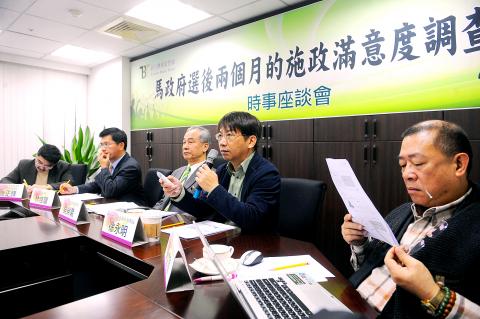President Ma Ying-jeou’s (馬英九) approval rating has plummeted to its lowest level since the aftermath of Typhoon Morakot in 2009 amid recent controversies over US beef and avian flu, a recent poll showed.
Only 26.1 percent of respondents said they were satisfied with Ma’s performance, with 62.1 percent disapproving of the president, the survey conducted by Taiwan Brain Trust think tank on Wednesday and Thursday showed.
Those figures were the lowest since August 2009, when Ma’s approval ratings dropped to 16 percent after his handling of Morakot, the deadliest typhoon in Taiwan’s history, which killed hundreds of Taiwanese, the think tank said.

Photo: Wang Min-wei, Taipei Times
“The numbers signal a crisis for the Ma administration and, as you can see, the situation is getting worse,” Democratic Progressive Party (DPP) Legislator Lin Chia-lung (林佳龍) said.
Responses to almost all the questions asked in the survey were unfavorable to Ma. More than half of respondents said they were unhappy with his performance over US beef imports, the H5N2 avian flu outbreak, rising commodity prices and tax reform.
On the recent US beef controversy, 54.8 percent of respondents questioned Ma’s integrity, because he pledged not to lift the ban on the growth additive ractopamine during the election campaign. A total of 67.7 percent disapproved of the government’s conditional lifting of the ban.
When asked about the alleged cover-up of an avian flu outbreak, 54.1 percent of respondents said they believed that government agencies had deliberately concealed information and 73.8 percent said the government’s handling of the outbreak was unacceptable.
These results suggest two problems in the Ma administration — lack of integrity and incompetence, Lin said.
Shih Cheng-feng (施正鋒), a professor at National Dong Hwa University, said Ma’s role in the recent controversies reflected a serious flaw in Taiwan’s Constitution.
At the beginning of his term in office, Ma was able to sit in the Presidential Office and do nothing, while claiming to be simply -fulfilling a role regulated by the Constitution, whereas he now “seems have his hands on everything” and is ignoring the Executive Yuan, Shih said.
According to the survey, Ma’a approval ratings never exceeded 40 percent after May 2009, one year after he took office.
Shih also highlighted the implications of answers to one of the survey questions, namely that 76.6 percent of respondents believed that public health was more important than relations with the US.
“It appears to me that people are more hostile to the US than they were and the Ma administration is going to have to work even harder to mend relations with Washington in the future,” he said.
Shih also said that former DPP chairperson Tsai Ing-wen (蔡英文), an experienced negotiator on trade issues who is familiar with international affairs, should have been playing a more prominent role for the DPP during the recent controversies over US beef and avian flu.
The survey, which collected 1,116 samples and had a margin of error of plus or minus 3 percent, also found that 53.1 percent of respondents were not satisfied with the new Cabinet led by Premier Sean Chen (陳冲).

CHAOS: Iranians took to the streets playing celebratory music after reports of Khamenei’s death on Saturday, while mourners also gathered in Tehran yesterday Iranian Supreme Leader Ayatollah Ali Khamenei was killed in a major attack on Iran launched by Israel and the US, throwing the future of the Islamic republic into doubt and raising the risk of regional instability. Iranian state television and the state-run IRNA news agency announced the 86-year-old’s death early yesterday. US President Donald Trump said it gave Iranians their “greatest chance” to “take back” their country. The announcements came after a joint US and Israeli aerial bombardment that targeted Iranian military and governmental sites. Trump said the “heavy and pinpoint bombing” would continue through the week or as long

TRUST: The KMT said it respected the US’ timing and considerations, and hoped it would continue to honor its commitments to helping Taiwan bolster its defenses and deterrence US President Donald Trump is delaying a multibillion-dollar arms sale to Taiwan to ensure his visit to Beijing is successful, a New York Times report said. The weapons sales package has stalled in the US Department of State, the report said, citing US officials it did not identify. The White House has told agencies not to push forward ahead of Trump’s meeting with Chinese President Xi Jinping (習近平), it said. The two last month held a phone call to discuss trade and geopolitical flashpoints ahead of the summit. Xi raised the Taiwan issue and urged the US to handle arms sales to

State-run CPC Corp, Taiwan (CPC, 台灣中油) yesterday said that it had confirmed on Saturday night with its liquefied natural gas (LNG) and crude oil suppliers that shipments are proceeding as scheduled and that domestic supplies remain unaffected. The CPC yesterday announced the gasoline and diesel prices will rise by NT$0.2 and NT$0.4 per liter, respectively, starting Monday, citing Middle East tensions and blizzards in the eastern United States. CPC also iterated it has been reducing the proportion of crude oil imports from the Middle East and diversifying its supply sources in the past few years in response to geopolitical risks, expanding

Pro-democracy media tycoon Jimmy Lai’s (黎智英) fraud conviction and prison sentence were yesterday overturned by a Hong Kong court, in a surprise legal decision that comes soon after Lai was jailed for 20 years on a separate national security charge. Judges Jeremy Poon (潘兆初), Anthea Pang (彭寶琴) and Derek Pang (彭偉昌) said in the judgement that they allowed the appeal from Lai, and another defendant in the case, to proceed, as a lower court judge had “erred.” “The Court of Appeal gave them leave to appeal against their conviction, allowed their appeals, quashed the convictions and set aside the sentences,” the judges